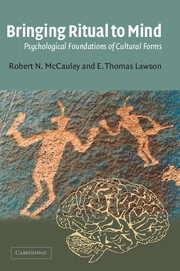Book contents
- Frontmatter
- Contents
- List of figures
- Preface
- 1 Cognitive constraints on religious ritual form: a theory of participants' competence with religious ritual systems
- 2 Ritual and memory: frequency and flashbulbs
- 3 Two hypotheses concerning religious ritual and emotional stimulation
- 4 Assessing the two hypotheses
- 5 General profiles of religious ritual systems: the emerging cognitive science of religion
- Notes
- References
- Index
5 - General profiles of religious ritual systems: the emerging cognitive science of religion
Published online by Cambridge University Press: 02 December 2009
- Frontmatter
- Contents
- List of figures
- Preface
- 1 Cognitive constraints on religious ritual form: a theory of participants' competence with religious ritual systems
- 2 Ritual and memory: frequency and flashbulbs
- 3 Two hypotheses concerning religious ritual and emotional stimulation
- 4 Assessing the two hypotheses
- 5 General profiles of religious ritual systems: the emerging cognitive science of religion
- Notes
- References
- Index
Summary
Chapter overview
We aim to show how the considerations of ritual form our theory emphasizes motivate an account of general evolutionary trends in religious ritual systems that affect the distributions of these cultural representations. Toward that end, our principal goal is to show how a small set of psychological variables exert selection pressures on all religious ritual systems, and how those systems' resulting properties insure that they meet the mnemonic and motivational demands necessary for their transmission. Well-adapted ritual systems are ones that cope with the constraints these psychological variables impose.
Nothing about this analysis will depend upon any of the details about either the Pomio Kivung or the Dadul-Maranagi splinter group. We continue to devote attention to them, because they serve as a means for highlighting differences between our and Whitehouse's views and because they so splendidly illustrate one of the dynamical profiles our analysis identifies. Although, finally, we will maintain that the materials from Whitehouse's ethnography constitute an exceptional case in some important respects, it is for just that reason that they will serve so well in explicating other patterns. Studying atypical cases in order to illuminate the workings of the typical ones is a standard research strategy in science.
It is uncontroversial that the general evolution of both the Dadul-Maranagi splinter group's ritual innovations and its innovative rituals was toward higher levels of sensory pageantry.
- Type
- Chapter
- Information
- Bringing Ritual to MindPsychological Foundations of Cultural Forms, pp. 179 - 212Publisher: Cambridge University PressPrint publication year: 2002



